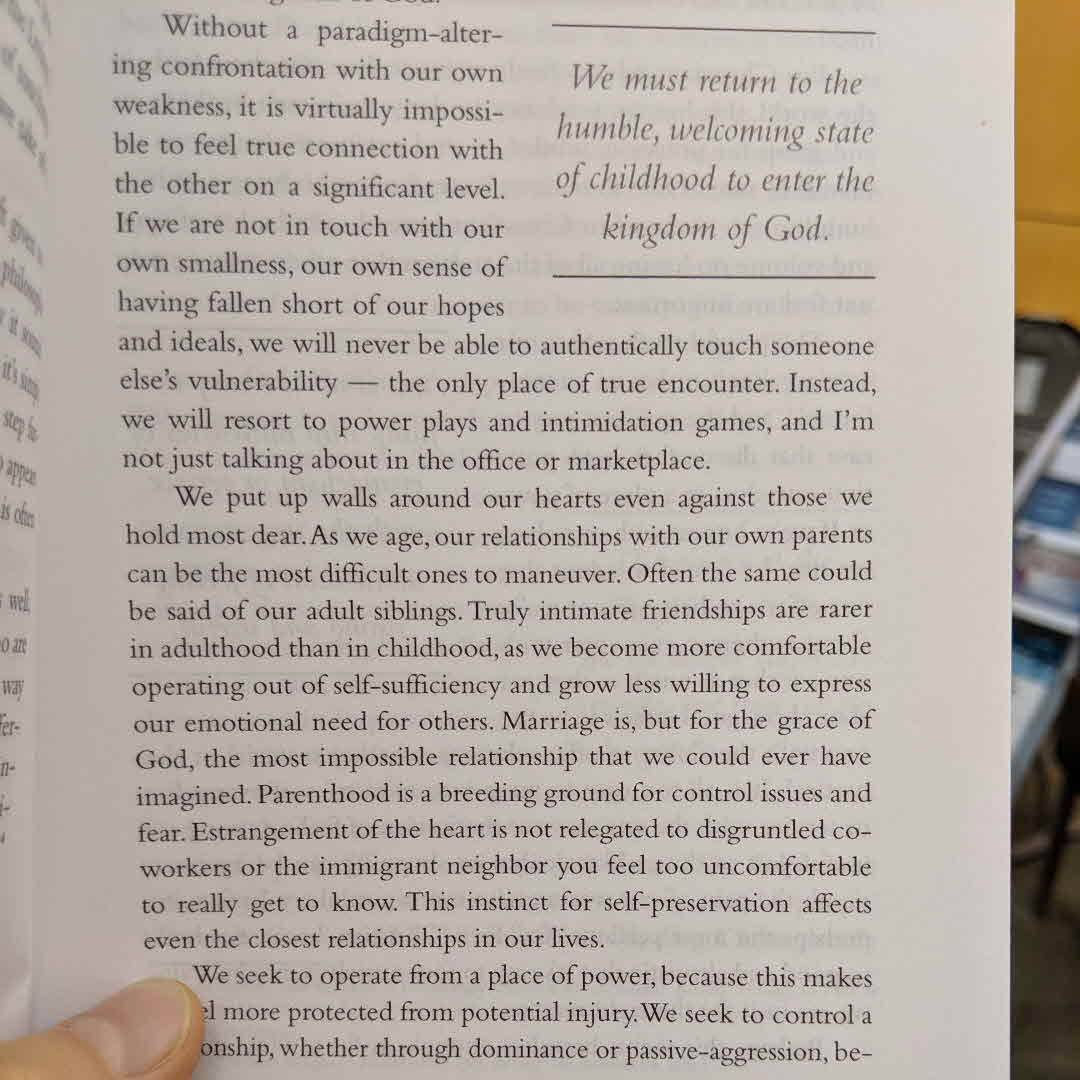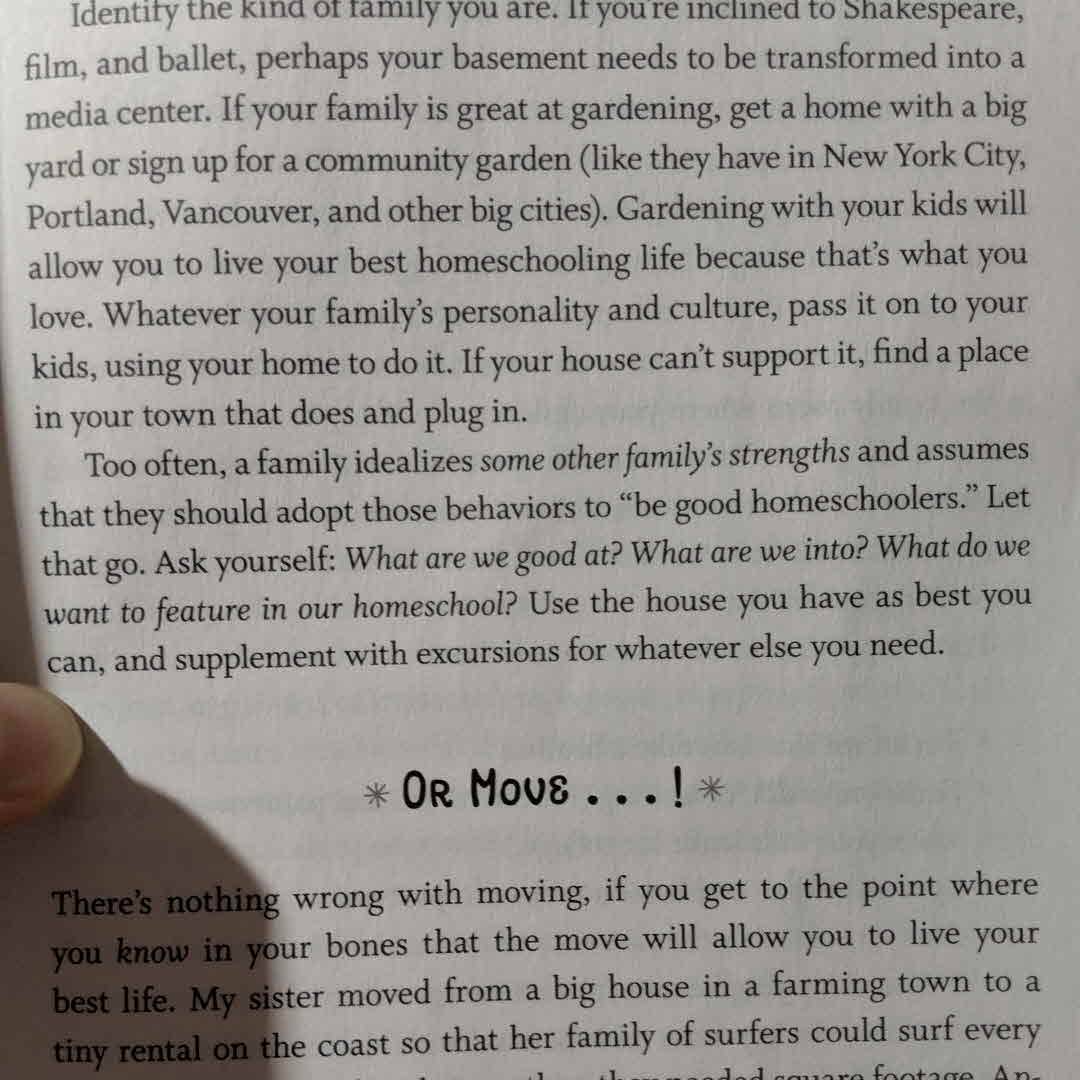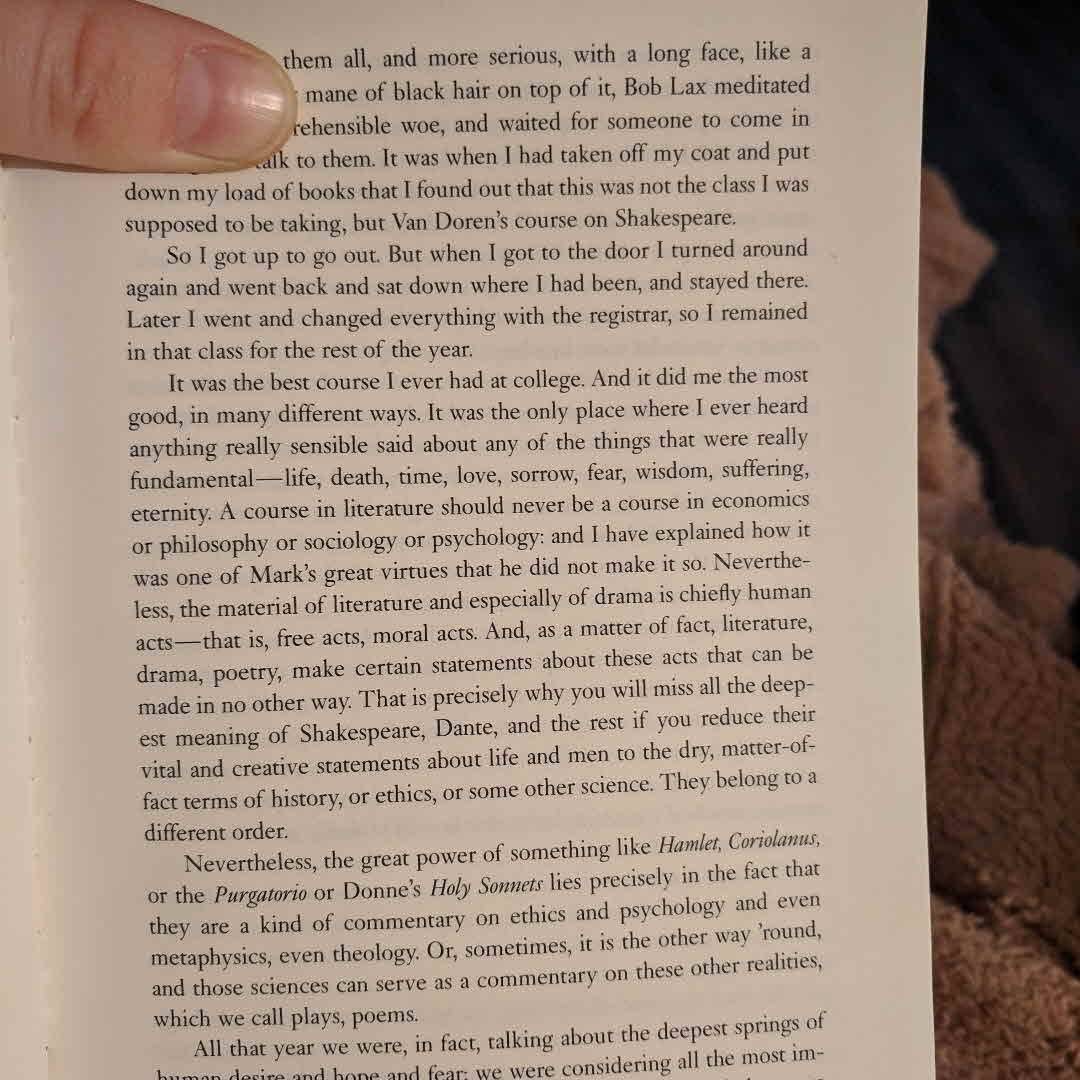
😭😭😭

It's rare that I want to purchase a book after reading it. But, this book is filled with so many good ideas and things I want to come back to, I will be buying it. It was wonderful.

What are we good at? What are we into? What do we want to feature in our homeschool?
Surprise sparks interest. Mystery sustains it. Think of mystery as the kindling you add to the fire. Surprise strikes the match. Mystery (the unknowable heart of all enterprises) keeps the fire going.
I had discerned the ways in which we had been sculpted by a tradition given to us by others, a tradition of which we were either willfully or accidentally ignorant. I had begun to understand that we had lent our voices to a discourse whose sole purpose was to dehumanize and brutalize others—because nurturing that discourse was easier, because retaining power always feels like the way forward.
For so long Marianne and Albrecht and many of their friends had known Hitler was a lunatic, a leader whose lowbrow appeal to people's most selfish, self-pitying emotions and ignorance was an embarrassment for their country. They had watched him make a masterwork of scapegoating Jews for Germany's fall from power and persuade his followers that enlightenment, humanity, and tolerance were weaknesses -- "Jewish" ideas that led to defeat.
Thus, a new treasure has entered the Liturgy. We start, as it were, with Nazareth, in the act of preparation, and from there we move -- in the middle of the Canon -- toward Golgotha, and finally on into the Resurrection event of Communion. I think if we hear these new old prayers in this way, then they can become for us a wonderful treasure in uniting us with the earthly life of Jesus.
Ragnfrid Ivarsdatter thought it seemed like a new wedding night, and a strange one. Happiness and sorrow flowed into each other, carrying her along on waves so powerful that she felt her soul beginning to loosen its roots in her body.
At this point, I've read quite a few books about the Enneagram. I felt like I was being drawn into something truly profound. But I didn't know what the next step was. I've learned a lot about my type, but I needed a next step, a "this is what you need to do to grow" sort of guide. And, Mr. Heuertz's book is exactly that. Truly wonderful.
Eights are among the Rejection Dominant Affect Group, using their powerful presence to move against the nurturing they need (and are frequently incapable of offering themselves in constructive or healthy ways) as a way of preemptively forcing rejection or, conversely, building trust.
Those in the Head Center, the types most dialed into figuring out and preventing threats to certainty, safety, and freedom, require a healthy dose of silence to quiet the constant churning of their thoughts. In the peace of inner quiet, head types can hear the truth that they have enough, refuting the lie “I am what I have” and loosening the addictive grasp that security and survival have in and through this center.
Gut people who are obsessed with control, heart people who are obsessed with connections, and head people who are obsessed with competence all need to find freedom from the ways they deal with their inner dread.
The Scriptures tell us, “Love your neighbor as yourself,” but most of us never really learn to love ourselves, thinking we can make up for this deficit if we practice loving others. We have to practice what love is by making room for who we are—the good and the bad. Otherwise, the love we offer others will always lack the depth of its potential.
Because he turned death into a proclamation of thanksgiving and love, he is now about to be present down through all ages as the wellspring of life, and we can enter into him by praying with him.
The Eight exemplifies the fundamental need to be against. Eights are against everything. Even when they agree, they‘ll find a way to turn anything into combat or sparring. This is how Eights build trust—through pushing and fighting. It‘s their attempt to size up the trustworthiness of others, an unconscious way of determining if people will stand up to them by standing up for themselves.
Those in the Body Center are gut people who experience life through intuitive instincts and tactile engagement with their senses. People in the instinctive center engage the world through activity in an effort to assert and maintain a sense of their control. Gut people are generally more impassioned than emotional, and their great determination is often the source of their pain.
When heart people allow comparison to lead to feelings of disconnection, they blame themselves and can be overcome with profound experiences of shame. Shame in turn produces a sense of fear—the fear that they are unworthy to experience their own needs. This fear is followed by a feeling of even more shame that comes from having needs in the first place.
Heart people are social types who feel their way through life by leaning into their emotional intelligence. Those in the Feeling Center teeter between compulsions for connection with others and comparison with others to validate their own sense of worth.
Fundamentally, head people are obsessed with quieting their inner distress in an effort to create external peace and security. Head people don‘t have time for the irrational impulses of the instinctive types, nor do they have the patience to truly engage the emotional complexities of the feeling types; rather, they methodically face each of life‘s problems searching for solutions.
Head people, those in the intellectual center, have highly developed mental faculties they use to assess and address everything in life that is experienced as a threat or an assault on their inner state. Head people believe in competency as the cure for instability. Through mastering their environment, head people think they‘re able to secure their own self-preservation.
Another way of looking at the Enneagram is just like that: if you believe in the doctrine of original sin, then the Enneagram exposes the shape of your tragic flaw—the aspect of you that is most vulnerable to sin—as it is forced from your soul through the pressure of guilt, shame, stress, anxiety, fear, frustration, or anger.
The contemporary Enneagram of Personality* illustrates the nine ways we get lost, but also the nine ways we can come home to our True Self. Put another way, it exposes nine ways we lie to ourselves about who we think we are, nine ways we can come clean about those illusions, and nine ways we can find our way back to God.
My kids loved this book. They're begging me to get the next one in the series 😂 it's a wonderful story.
The canvas of the crucified Christ hangs up in the gable over the table. This vulnerable communion is a risk. Givenness is a risk. The only way to abundant life is the broken way of risk.
Then the inevitable happens, what always happens: the heart breaks, rips right down the center, just where she tried to smooth everything out. I'd swallowed hard.... Shalom looks down at her [broken heart]. I am waiting for her to brim and overrun.
"It's all okay." She finds the right first words. She holds the torn bit of her paper heart out to me. "Maybe the love gets in easier right where the heart's broke open?"
The real Jesus turns our questions of why -- why this brokenness, why this darkness? -- and days, "You're asking the wrong question. You're looking for someone to blame. There is no such cause-effect here." "This happened so the power of God could be seen in him." There's brokenness that's not about blame. There's brokenness that makes a canvas for God's light. There's brokenness that makes windows straight into souls.
When you somehow pass your brokenness onto your own people, why does it hurt in a way physical pain never could?

Literature speaks of the fundamental things: life, death, time, love, sorrow, fear, wisdom, suffering, eternity.
God bless you, little Kristin, I've been to Paris and traveled elsewhere in the world as well, and yet you mustn't think me any better for it, because I fear the Devil and love and desire this world like a fool. But I hold on to the cross with all my strength---one must cling to it like a kitten hanging on to a plank when it falls into the sea.
Souls are like athletes, that need opponents worthy of them, if they are to be tried and extended and pushed to the full use of their powers, and rewarded according to their capacity.
Parents and children. The simplest relationship in the world and yet the most complex. One generation passes to the next a suitcase filled with jumbled jigsaw pieces from countless puzzles collected over time and says, "See what you can make out of these."